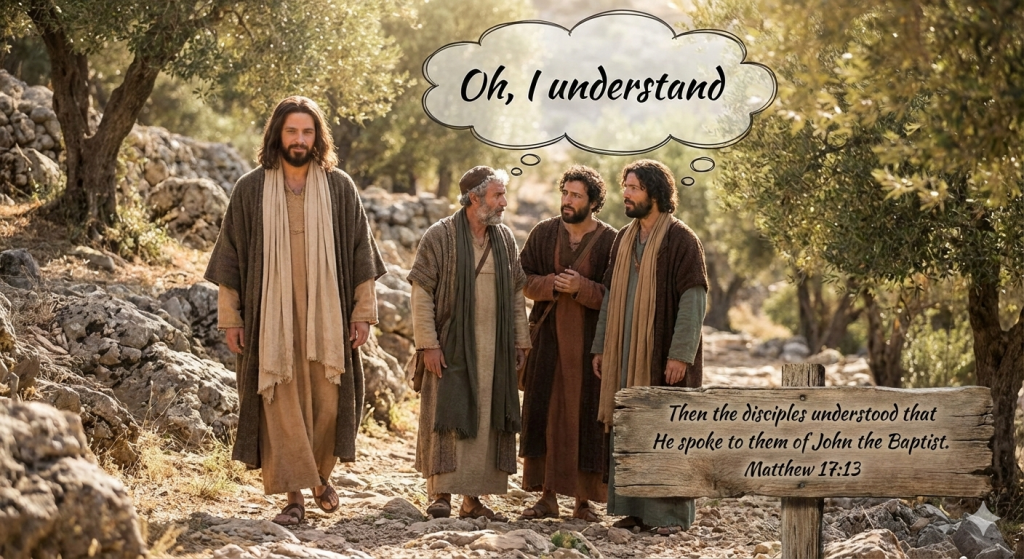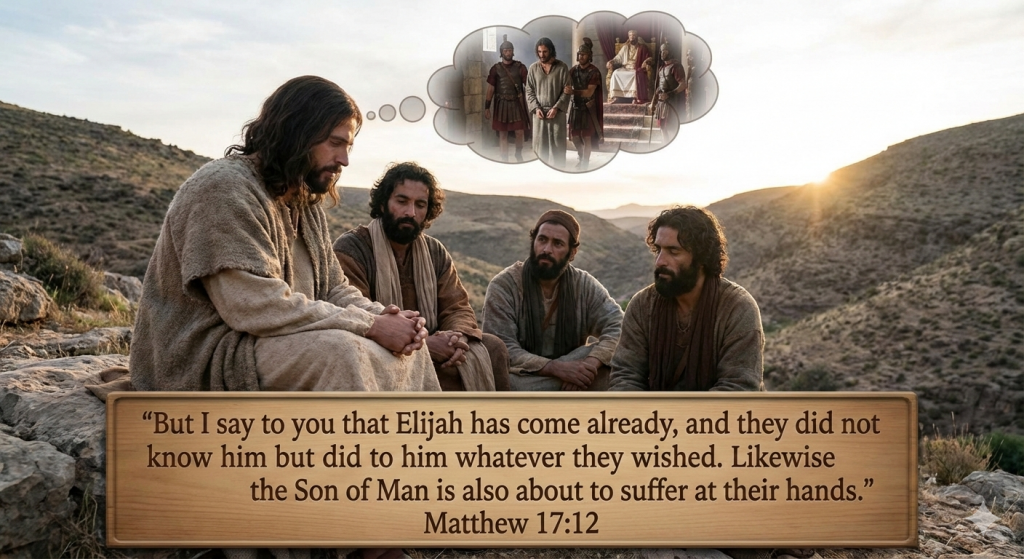Friday, 27 February 2026
Then the disciples understood that He spoke to them of John the Baptist. Matthew 17:13
Note: You can listen to today’s commentary courtesy of our friends at the “Bible in Ten” podcast. (Click Here to listen)
You can also read this commentary, scrolling with music, courtesy of our friends at “Discern the Bible” on YouTube. (Click Here to listen), or at Rumble (Click Here to listen).
“Then the disciples, they comprehended that He spoke to them concerning John the Immerser” (CG).
In the previous verse, Jesus told the three disciples that Elijah had come already. And yet, they didn’t know him, and they did to him whatever they wished. He included the thought that they would likewise cause the Son of Man to suffer at their hands. Having said that, it next says, “Then the disciples, they comprehended.”
The word suniémi has already been seen eight times. It is a word that signifies “to put together.” They joined the facts that have been presented to them and have made a conclusion concerning what Jesus is saying, comprehending what they had not yet understood. What they comprehended is “that He spoke to them concerning John the Immerser.”
Jesus never said that the person on the mountain with Him and Moses was John the Baptist. Matthew clearly identifies him twice as Elijah. However, on the way down, their question was about the coming of Elijah according to the prophecy of Malachi 3:1 and 4:5, 6.
They could not understand how Elijah fit into the scenario if he was supposed to come before the coming of the whopping and fearful day of Yehovah. The voice from heaven told them to listen to Jesus. If Jesus was now the one to listen to, how could Elijah be the messenger to tell Israel to restore the hearts of the people?
John came in the spirit and power of Elijah, not as Elijah himself (John 1:21). Unless one believes that the book of Revelation has been fulfilled, as preterists do, which is a giant error in eschatology, the day of the Lord referenced by Malachi is still future.
Life application: To assume that all prophecy except the return of Christ is fulfilled is to dismiss a literal interpretation of a majority of the Bible, inclusive of both testaments. And this isn’t just in plain, easy-to-understand prophecies and promises, but in typology as well.
It is true that typology can be easily manipulated or misinterpreted, but a proper evaluation of what is being presented leaves no doubt about what is coming. God is not through with Israel, and there is a time when they, as a nation, must (and will) choose to accept that Jesus is their long-rejected Messiah.
How anyone can read and misinterpret Romans 9-11 and think that God is done with Israel would be laughable if it were not so sad. One example from that dissertation says –
“For I do not desire, brethren, that you should be ignorant of this mystery, lest you should be wise in your own opinion, that blindness in part has happened to Israel until the fullness of the Gentiles has come in. 26 And so all Israel will be saved, as it is written:
‘The Deliverer will come out of Zion,
And He will turn away ungodliness from Jacob;
27 For this is My covenant with them,
When I take away their sins.’” Romans 11:25-27
A simple question to ask concerning Paul’s words is, “Has the fullness of the Gentiles come in?” Obviously not! Another question that follows naturally is, “Does Paul here call the Gentiles either Israel or Jacob?” Obviously not! He calls them “Gentiles,” thus providing a clear and definite distinction between the two.
As Paul refers to turning away ungodliness from Jacob, something Elijah is prophesied to do in Malachi 4, and that is to occur only after the fullness of the Gentiles has come in, then it is as obvious as the nose on a preterist’s face that there is yet a plan and purpose for Jacob, meaning Israel but stated as Jacob to make sure even the dullest sort can understand he is referring to the wayward nation of Israel.
Are they enemies of the gospel? Yes! (Romans 9:28). Are they still beloved for the sake of the fathers? Yes! (Romans 9:28). Are their gifts and calling irrevocable? Yes! (Romans 9:29). Israel, a people who are currently not God’s people, will be His people again someday. This is what the Bible teaches.
God, despite their disobedience, will again be rich in mercy to them, demonstrating His goodness even to those who have completely walked away from Him, turning their hearts to every “god,” idol, and perversion known. Why? Because He is faithful even when we are unfaithful. Thank God for His merciful kindness to the people of the world.
Lord God, how can we not praise You for who You are and for all You have done for us, even us. Our hearts are wicked, our thoughts are perverse, our actions belie our profession again and again. And yet, because of Your covenanting with us through the blood of Jesus Christ, You remain rich in mercy to us. Thank You, O God, for Jesus Christ our Lord. Amen.





